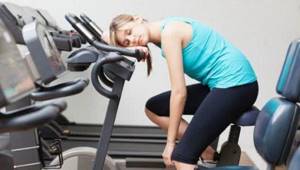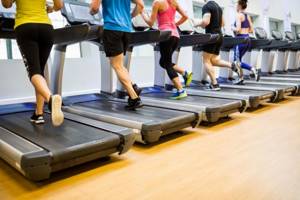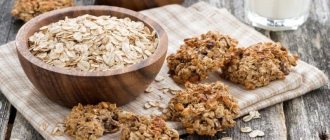Home / Beauty and Health / Fasted Cardio
In this article, I will tell you about fasted cardio, what its advantages are, why it is needed, etc. and so on.
For those unfamiliar, cardio is any aerobic activity. For example, running, walking, cycling, skateboarding, rollerblading, etc. and so on. Read more about this in the main article: “What is cardio training.”
So, cardio training on an empty stomach is useful because during this time period the body contains a minimum amount of ENERGY (CARBOHYDRATES).
And who doesn’t know yet, cardio training should be carried out precisely when the body contains a minimum of ENERGY (or when it is completely absent) because this is the only way fat will be purposefully burned, and burned to the maximum (as efficiently as possible) . Do you understand?
After sleep, there is no energy (carbohydrates) in the body, because they did not enter the body, of course, if a person did not fornicate at night, ACCORDINGLY FAT WILL BE BURNED TO THE MAXIMUM at this time! That's why many athletes run in the morning (on an empty stomach) or ride a bike, or rollerblade, or simply use brisk walking, in general, there are many options. Who likes what...
In the fitness/bodybuilding industry, most people when talking about cardio are talking about:
- Running or fast walking;
- Work on various cardio equipment, such as a treadmill, exercise bike, etc.
- other directions are rarely used...
Personally, I absolutely always (in particular to my clients) recommend using low-intensity cardio (either slow running or fast walking) for a long time (60 minutes or more, but as your training level increases, of course, gradualness is important, i.e. if a person has never run before, etc., then you should start with 15 minutes, then 20, 25 and gradually reach the required 60 minutes or more; the rule is simple: the slower you go, the further you will get).
Why low intensity?
Because with low intensity cardio, only FAT will be burned (without MUSCLE). And if the CARDIO INTENSITY IS HIGH, both FAT and MUSCLE will be burned (which is not good). It’s not good, because the goal of any drying (weight loss) is to preserve muscles as much as possible, because the beauty of bodily forms is made up of muscle tissue (muscles), and not skin and bones.
CONCLUSION: Low intensity cardio (landmark, fast walking or slow running).
The effectiveness of fasted cardio
There is no clear opinion on how effective morning cardio training performed on an empty stomach is. Disputes on this topic have been going on for a long time. Both supporters and opponents cite the results of scientific research, biological processes and mechanisms occurring in the human body as evidence of their rightness. Research by scientists also shows conflicting conclusions. To come to any decision, you should take a closer look at how energy is spent during training.

The source of energy expended during both anaerobic and aerobic exercise is carbohydrates accumulated in the body, that is, glycogen. This happens until its reserves run out. In the morning hours its level is minimal. If a person does not have breakfast, protein catabolism begins to occur. Proponents of fasted cardio cite this fact as an argument for using fats instead of carbohydrates when performing a morning workout.
However, we should not forget that the body is the last to begin to “part with” its reserve energy reserve, which is fat. And even if glycogen is at zero, for some time it will not be the fat layer that will be consumed, but proteins - muscle tissue. Therefore, when you perform cardio on an empty stomach, you lose both fat and muscle. This is especially important for those who not only want to lose weight, but also lift weights in an effort to gain a beautiful and firm body. People who fundamentally need to preserve muscle mass are advised not to exercise on an empty stomach, but to have breakfast.
Professional athletes who take part in competitions resort to fasted cardio to speed up the fat burning process. However, the concept of “on an empty stomach” is conditional for them, since they consume amino acids before training. This avoids the consumption of muscle protein as an alternative source of energy.
How to do fasted cardio for weight loss

First of all, you must wake up well. Some people only need a glass of water, some a cup of coffee, and some even need a whole pre-workout supplement. But you definitely need to wake up. It's ideal if you don't use stimulants before you ride the exercise bike or get on the treadmill. It would also be better to take a shower before doing your workout, and a contrast shower would be better. This will help you tone your blood vessels and develop your joints.
Before the start of the lesson, you should perform 9-10 rotations in the main joints, 10-12 squats, push-ups and crunches. This will help us tone the muscles, fill them with blood and allow us to conduct the exercise more effectively.
You should perform low-intensity work for 10-12 minutes at the beginning of your workout. It feels like you should reach the first sweating so that your body does not become overloaded in the future. Next, you should bring the pulse to working and continue moving for 20-30 minutes. After which we gradually reduce the intensity for 5 minutes, stretch the muscles of the front and back of the thighs and back.
Fasted cardio as part of a training program
Doing cardio without breakfast is recommended in the following cases:
- upon reaching a “plateau” - a reduced rate of burning fat deposits against the backdrop of the body’s adaptation to changes in diet and exercise;
- after a complete restructuring and adaptation to a sports program that has already been used for a long time.
It is recommended to resort to “fasted” cardio on a temporary basis with certain breaks. Regular exercise will lead to the body adapting to this regime. The main thing to remember is that muscle loss is inevitable, and in some cases, depending on individual characteristics, lethargy and fatigue may occur.
When can a beginner do fasted cardio?
No, you won't die if you do fasted cardio for half an hour to 40 minutes. Your muscles do not “degrade” and will not become exhausted. In general, nothing bad will happen if you do not experience the following symptoms:
- during cardio on an empty stomach you feel dizzy and your vision gets dark;
- after finishing your workout, you feel very weak and want to fall asleep immediately;
- you lose your appetite and all you want to do is sleep;
- during morning training, ligaments are pulled and joints hurt, no matter how low-intensity it is;
- you cannot train in the morning due to objective life circumstances, and are forced to reduce the amount of sleep for the sake of training;
- Cardio on an empty stomach causes a “brutal” appetite during the day, and you cannot solve this problem by “adjusting” the level of exercise.
Those experiencing weakness and dizziness should check their blood sugar levels and visit an endocrinologist. It may also be due to the diet level being inappropriate for you. Perhaps your symptoms during exercise are due to the fact that you eat too few carbohydrates for a long time, or your diet simply does not meet the basic needs of the body. Fans of low-carb or too low-calorie diets should avoid excess cardio.
If ligaments and joints hurt, this may be due to an unbalanced diet, a lack of fat in the diet, microtraumas, or diseases, in which case it is better to do only non-impact cardio, and it is better not to do it in the morning.
An increase in appetite during the day can be controlled by increasing the amount of fiber in the diet and getting the amount of protein you need according to the standards (from 1 g). If you can't do this, the problem may not be related to cardio.
To have breakfast or not after fasted cardio
A common mistake made by those practicing this type of training is to completely skip the morning meal. Many people believe that if you don't eat before lunch, the effect you get from fasted cardio will increase. This approach is fundamentally wrong.
The lack of food in the first half of the day serves as a signal to the body for an upcoming hunger strike. It triggers the mechanism of fat accumulation. Consequently, muscle mass is lost, and the energy received from subsequent meals is instantly deposited in the fat layer.
A carbohydrate breakfast after cardio training allows you to avoid this. This type of eating not only blocks the fat storage program, but also significantly reduces the loss of muscle mass. But even taking such measures, you should not perceive this type of physical activity as a full-fledged fat burning training.
To start the process of burning fat, it is not enough just to do cardio training, you also need to reduce the number of calories you consume. If the calorie content of the daily diet remains high, even the most intense workouts will not be able to compensate for the excess energy entering the body with food, and the result will be practically zero.
Fasted Cardio and Normal Healthy Weight Loss

For regular healthy weight loss, fasted cardio is not necessary. Only A. Kovalkov, who promotes the following type of leisure for overweight people, does not think so:
- drink 1000 mg of l-carnitine;
- We stomp in the morning at a free pace for an hour and a half.
Both procedures together give an impressive effect. Anyone who does them loses weight. And everyone else...lose weight too, subject to a calorie deficit and adequate training, but Kovalkov is silent about this. Of course, how else can you force an adult to eat only greenfinches, chicken breasts and egg whites for six months, and spend an hour and a half walking. This is all pretty boring. And yes, this is effective if we are talking about significant obesity, and there is no opportunity to engage in more adequate types of physical activity.
Fasted cardio is considered a good option because:
- the body's resources are depleted, there is almost no glycogen in the muscles and liver;
- Even low-intensity physical work will lead to fat burning.
A beginner has only two problems - he can easily “eat” enough carbohydrates to have enough glycogen for morning cardio too. And secondly, morning cardio interferes so much with living a normal life and getting enough sleep that it can lead to overeating due to increased stress levels.
In general, you can, of course, use a regimen with carnitine and “burn targeted fat” if you tolerate it normally, but if not, you don’t need it at all. After all, for those who are losing weight from an unhealthy weight to a healthy one, such measures are not at all necessary. Weight loss will happen even with a simple calorie deficit.
You can do cardio after breakfast or dinner, fortunately, you need to concentrate not on it, but on how exactly you eat, whether you are overeating, and whether you are maintaining a calorie deficit.
Should you include this kind of cardio in your training program?
This directly depends on the purpose of the training. For example, if the goal is only to lose weight, then training will be quite appropriate. During physical activity, the source of energy is glycogen - carbohydrates accumulated in the body. In the morning, glycogen levels are minimal, so the body begins to burn fat during training. On the other hand, fat is the last thing the body breaks down. In the beginning, protein will be wasted as energy, i.e. muscle. Accordingly, fasted cardio promotes the loss of not only fat, but also muscle, which is not suitable for people who, in addition to losing weight, want to gain a toned body.
“Hungry” cardio is also not suitable for people who, in addition to morning classes, are planning an evening workout. In this case, it is better to have breakfast in the morning - the effect of losing weight will be greater, and the load on the body will be more gentle.
Each person can decide for himself whether such training is suitable for him or not. Only an experimental path will help you make the right choice. Try not to eat before training or, conversely, eat only proteins or carbohydrates and compare the results. The option to which the body responds better and will be optimal, even if it is not suitable for another person.
If you do cardio on an empty stomach, will it speed up the fat burning process?
Disputes on this matter continue to this day, and I assure you that even if you re-read all the information on this topic, you will never find a specific and only correct answer. There are many supporters and opponents of “fasted cardio,” and both sides cite scientific research and the mechanisms of human physiological processes as arguments. The problem is that scientists also come to contradictory conclusions in their research. Let's take a closer look.
As is known, glycogen is used primarily for energy formation, i.e. carbohydrates that are stored in your body. Moreover, glycogen is used both when performing strength exercises and cardio. And until it is depleted, other sources cannot be used to produce energy.
After sleep, glycogen reserves in our body are almost exhausted and if you do not replenish them, the process of protein catabolism begins. Proponents of fasted cardio say that in this case fat will be used as an energy source, because there are simply no carbohydrates left. But you need to remember that fat is the body’s reserve reserve, and it really “does not want” to part with it and will try to use it last. Therefore, no matter how you want it, even if glycogen is at zero, before using fat, muscle protein will be used for some time as an energy source, that is, literally your muscles. I have already mentioned that losing weight and burning fat are different concepts. So, using fasted cardio, you must understand that you will lose not only fat, but muscle. This is fundamentally important for those who train with weights and strive for an elastic muscular body. Therefore, if you do not want to lose muscle, it is still better to have breakfast before morning cardio.
However, many competitive athletes do use fasted cardio in preparation for competition to speed up the fat burning process. But before such a workout, these people always drink BCAAs (amino acids) so as not to use muscle protein as energy.
The effectiveness of fasted cardio
Morning cardio on an empty stomach is considered very effective in terms of a person’s physical condition. Training triggers a number of processes:
- The release of beneficial hormones into the blood due to the stress that the body begins to experience.
- Impact on adipose tissue of growth hormone and testosterone, which help the body to take energy from fat reserves.
- Acceleration of metabolism with regular training.
- Active work of the endocrine system, which will lift your spirits and set you up for the work day.
There is an opinion that cardio on an empty stomach in the morning is more effective for weight loss than training on a full stomach. There is another point of view: cardio training does not have to be “hungry” to burn fat. So is it possible to do cardio on an empty stomach for weight loss or is this training aimed at strengthening the heart muscle?











